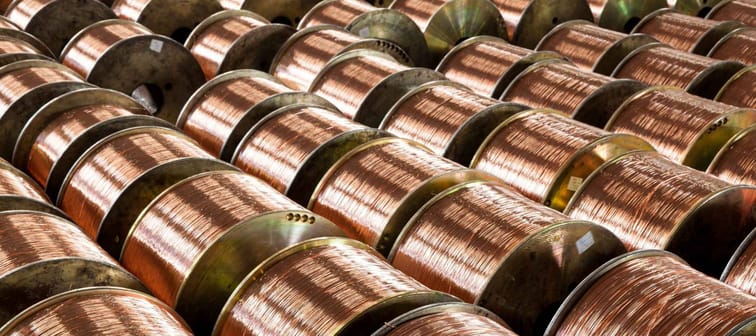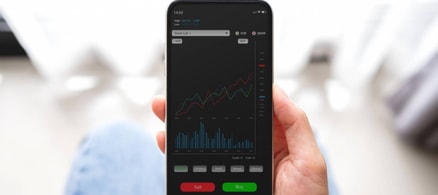Is copper a good investment?
Though copper places third after gold and silver for jewellers, it is first on the list for builders and engineers. Copper is durable, malleable and conducts heat and electricity extremely well.
You’ll find copper in industrial machinery but also the electrical wires running through your home, in your plumbing and on the bottoms of your pots and pans.
Its uses are so common and widespread that the base metal is often called “Dr. Copper” for its ability to diagnose the overall health of the economy.
But while the global recovery is one factor making copper more appealing, a number of major projects and trends are expected to continue ramping up demand.
Meet Your Retirement Goals Effortlessly
The road to retirement may seem long, but with WiserAdvisor, you can find a trusted partner to guide you every step of the way
WiserAdvisor matches you with vetted financial advisors that offer personalized advice to help you to make the right choices, invest wisely, and secure the retirement you've always dreamed of. Start planning early, and get your retirement mapped out today.
Get StartedWhy demand for copper may rise even more
As President Joe Biden pushes forward with his massive infrastructure plan to fix the country’s highways, rebuild bridges and upgrade airports and transit systems, expect copper to play a major role in these construction projects.
Copper is also key in the switch to electric cars and sustainable energy sources. Electric vehicles require two to four times more copper than their conventional counterparts.
Plus, copper’s antimicrobial qualities could make it useful for high-touch surfaces in hospitals and health care centers looking to quell the spread of infection — especially in the wake of COVID-19.
David Neuhauser, founder of hedge fund Livermore Partners, told CNBC in May that metals were “receiving a general tailwind from a weaker dollar and increasing moves toward green infrastructure.”
Neuhauser identified copper as Livermore’s favorite commodity at the time.
“I think copper is the new oil and I think copper, for the next five to 10 years, is going to look tremendous with the potential for $20,000 per metric ton,” Neuhauser said.
4 ways to invest in copper
Investors have a few different ways to put their money into copper, though some are trickier than others.
Here are four ways to get started investing in copper.
1. Bullion
Investors can just buy the metal, in the form of coins or bars, to save and later sell themselves. But if you’re looking to make a large investment, storage space will quickly become an issue.
2. ETFs
Commodity exchange-traded funds (ETFs) offer a simpler way to gain exposure without having to directly own the commodity. Some commodity ETFs let you zero in on a single commodity, while others group them together for broad-based exposure.
ETFs typically also have very low management fees, and you save even more by buying them through a zero-commission investing app.
3. Stocks
Another option is to invest in a specific copper-mining company. Keep in mind, the performance of the stock won’t perfectly match that of copper because of business factors like the company’s financials, the quality of its management team and its long-term production prospects.
As with ETFs, you can easily invest in commodity stocks through any number of investing apps — although a few will give you a free stock just for signing up.
More: 10 best investment apps
4. Futures
Investors can use futures contracts to bet on how a particular commodity’s price will move. Futures involve agreeing to buy or sell a given commodity at a predetermined price and time in the future.
While you can trade copper futures on exchanges like the COMEX and London Metal Exchange — assuming you have a brokerage account that offers it — novice investors should be extremely cautious due to the amount of borrowing typically involved and the volatility of most commodity prices.
Stop overpaying for home insurance
Home insurance is an essential expense – one that can often be pricey. You can lower your monthly recurring expenses by finding a more economical alternative for home insurance.
SmartFinancial can help you do just that. SmartFinancial’s online marketplace of vetted home insurance providers allows you to quickly shop around for rates from the country’s top insurance companies, and ensure you’re paying the lowest price possible for your home insurance.
Explore better ratesAn alternative to investing in copper
Investing in copper isn’t for everyone. Commodities in general are susceptible to big swings in value, and copper may be more susceptible than most.
Chile, Peru and China collectively account for nearly half the world’s mining production of copper, and Chile alone represents more than a quarter. Government policies, labor disputes and other forms of local disruption can all have an oversized impact.
One alternative for investors interested in commodities is investing in U.S. farmland. A new platform is making it possible for ordinary people to buy stakes in individual farms — and since food has intrinsic value, it tends to be insulated from whatever else is going on with the economy.
That said, farmland can be pricey to buy into. If you don’t have much cash to throw around, one popular investing app will allow you to invest your spare change. That way, even copper pennies can turn into serious profits with time.
Sponsored
Follow These Steps if you Want to Retire Early
Secure your financial future with a tailored plan to maximize investments, navigate taxes, and retire comfortably.
Zoe Financial is an online platform that can match you with a network of vetted fiduciary advisors who are evaluated based on their credentials, education, experience, and pricing. The best part? - there is no fee to find an advisor.








